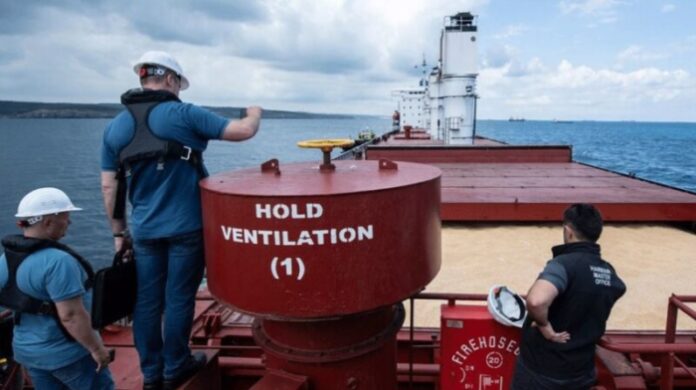
-
Exports of Ukrainian grain are under way after the Black Sea Grain Initiative was extended by Ukraine, Russia and Turkey on March 18, but the deal’s duration remains hazy
-
Russian President Vladimir Putin asserted on March 19 the extension would be for just 60 days, after the UN announced the deal without saying how long it will last
-
Putin warned that Russia will drop the deal altogether after 60 days if the US and EUdon’t lift their sanctions on Moscow’s food exports during the extension
-
Since the July 2022 deal on safe passage for grain ships on Black Sea to ensure global food supply, the initiative has moved 25 million tons of grains and food
Ukrainian grain volumes are flowing robustly again on the Black Sea, reflecting market optimism over the extension of the UN-brokered safe passage agreement among Ukraine, Russia and Turkey, but the duration is hazy as Russia asserts a 60-day grain flow, warning to drop the deal unless the US and Europe lift their sanctions on its own food exports, reports said.
The Black Sea Grain Initiative was renewed for a second time March 18, an official UN statement said. The world body did not say how long the extension last. So far, the initiative has moved 25 million metric tons of grain and foodstuff since July 2022, helping pull down food prices and stabilize global markets.
On March 21, Putin reaffirmed that Moscow had agreed to a 60-day extension but warned that Russia could abandon the grain deal altogether afterwards if the United States and European Union don’t lift their sanctions against Moscow grain and agricultural exports during the extension.
Wheat exports accounted for 19% of Ukraine’s seaborne flows this month, with the war-torn country claiming almost 63% of volumes of grains shipped so far in March, according to data from the Joint Coordination Centre (JCC), which facilitates the implementation of the grain initiative. The rest have been mostly sunflower products, barley, soya beans and rapeseed.
Nearness supported flows to Europe and Central Asia, which has attracted more than 47% of grain volumes out of the three key Ukrainian ports of Chornomorsk, Odesa, and Yuzhny/Pivdennyi during the period March 1-20, according to the JCC.
East Asia and the Pacific will receive a bit less than 39% of the flows so far in March, while the Middle East and North Africa region is bound to get about 10%. South Asia and Sub-Saharan Africa will each receive about 2% of the shipments.
Putin reaffirmed on Monday that Moscow has agreed to a 60-day grain flow from Ukrainian ports to global markets and could drop it altogether unless the US and EU allow its own exports to move.
Addressing a parliamentary meeting attended by lawmakers from African countries, Putin emphasized that Russia expects the facilitation of exports of its own agricultural products as part of the deal.
“A fair and comprehensive implementation of the Black Sea grain deal can only be ensured if our position is taken into account, and depending on that we will deal with the issue of our further participation in it,” the Associated Press quoted Putin as saying.
Grain flows so far in March out of the three key Ukrainian ports have reached 134,682 metric tons per day, about 11% more than the daily average observed in February.
As for the income distribution of the recipients, about 45% of Ukrainian grains during the period March 1-20 were expected to reach high-income destinations, with another 49% destined for upper-middle-income markets, JCC data showed.
About 5% of the flows this month are expected to reach lower-middle-income countries, and another 2% will go to low-income destinations.
An UNCTAD report, “A Trade Hope: The impact of the Black Sea Grain Initiative”, published on 9 March, said developing countries have benefited the most from the initiative, supporting food security among the most vulnerable.
But this progress is fragile and price pressures remain, the report said. While food prices have dropped from their all-time high at the start of the war, they’re still higher than pre-crisis levels.
“The Black Sea Grain Initiative, alongside the Memorandum of Understanding on promoting Russian food products and fertilizers to the world markets, are critical for global food security, especially for developing countries,” UN spokesman Stephane Dujarric said in a statement.
Ukraine’s Agriculture Minister Mykola Solsky said Ukraine had supplied nearly 500,000 tons of wheat for UN aid programs, and insisted on Saturday that the Black Sea export pact had been extended for 120 days and was an opportunity to keep helping those in need and “save the world from hunger.”




